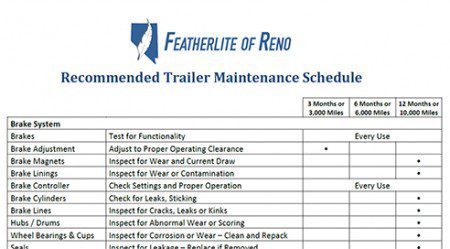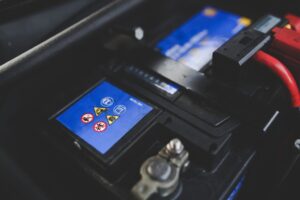
Taking care of your trailer through regular maintenance makes good sense for two reasons:
- It extends the life of your investment
- It protects your trailer’s resale value
But there’s a bigger reason: Safety when traveling down the road.
Seasonal To Do and Wish Lists
With the approaching winter season, now’s a good time to inspect your trailer and record any issues that should be addressed before the spring. Don’t forget to include any additions, upgrades or customization that you had in mind for this year, but just couldn’t seem to accomplish.
 To help you get started with your trailer maintenance, we’ve created a schedule for you to download here:
To help you get started with your trailer maintenance, we’ve created a schedule for you to download here:
Download Our Trailer Maintenance Schedule
Maintenance Checklist
A trailer maintenance checklist can help make keeping your trailer in good working order a simple task. Bear in mind that the systems and equipment that need regular maintenance are:
- Brakes and Bearings
- Electrical Components
- Breakaway System
- Couplers and Jacks
- Tires
- Battery
- Safety Chains
Here’s How Our Trailer Maintenance Checklist Breaks Out
Brakes and Bearings
Brakes should be tested to make sure that they are in good operating condition every time you use your trailer.
Check for cracked brake pads or unusual wear in the drum or magnet.
Inspect brake linings for wear or contamination every 12 months or 10,000 miles.
Brake cylinders should be checked for leaks or sticking, and brake lines should be inspected for cracks, leaks and kinks.
Hydraulic brake cylinders should also be checked for rust and water deposits. Be sure to bleed any air trapped in the lines!
Clean, inspect and re-pack bearings and replace grease seals at least every 2 years. This should be performed annually if you log more than 5,000-6,000 miles.
Electrical Components
First and foremost, and before every use, make sure that all trailer lights are working. With the trailer hooked up, turn lights on and make an inspection tour to determine that running lights are illuminated. Have someone step on the brake pedal and activate turn signals to confirm their functionality.
Inspect trailer wiring for wear or damage, like fraying that could short out against the frame.
Don’t overlook the rubber grommet wire access points. If they are damaged or missing, your wires can chafe and ground out.
Breakaway System
For trailers with brakes, federal law requires that your trailer is equipped with a functioning breakaway system.
Test the battery annually to make sure it’s in operating order, using a volt meter or simply by pulling the plunger.
Remember to immediately re-install plunger! Breakaway batteries have a limited life expectancy.
Couplers and Jacks
Because of the friction created during operation, a yearly inspection to identify excessive wear is recommended. Check the coupler to make sure that it is operating correctly, with the coupler latch moving the collar that locks under the hitch ball.
Consider greasing the inside of the coupler so that the hitch ball has some lubrication.
Make sure that you have the correct size ball for the coupler. You’ll find notation of corresponding ball size on the coupler.
Tongue jacks also need lubrication. If it’s equipped with a zirk, use a grease gun to grease the gears. Some jacks have a removable cap that will accept grease.
Tires and Wheels
Tires should be inflated to the manufacturer’s specifications, maintaining optimal pressure to reduce rolling resistance and fuel consumption.
Inspect tires for cuts, wear and bulging every 3 months or 3,000 miles.
Replace tires every 6 years, regardless of mileage, as they can become compromised even without having been on the road.
Wheels should be inspected for cracks, dents or distortion.
Wheel Lug Nuts should be torque to proper specifications.
Battery
Test your battery annually with a hydrometer to measure liquid in the cells. Most auto parts stores will perform the battery test as a free service.
Safety Chains
Check to make sure that these haven’t drug on the ground or worn through, and that they are properly fastened.
And Last But Not Least…
Make sure that your registration is current!
Now you’re ready for the road, confident in knowing that your trailer is, too.






